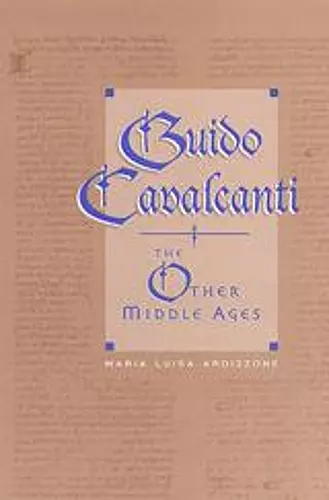Guido Cavalcanti
The Other Middle Ages
Format:Hardback
Publisher:University of Toronto Press
Published:29th Jun '02
Currently unavailable, and unfortunately no date known when it will be back

'Ardizzone has made a profound contribution to our understanding of medieval thought and poetry. She has written a book of great interest to any medievalist.' -- Otto A. Bird, Professor Emeritus of the Program of Liberal Studies, University of Notre Dame 'Professor Ardizzone has brought off an innovative reading of Cavalcanti's highly controversial, difficult poem, Donna me prega, and she has done so by correlating this poem to other works by Cavalcanti and their specific intellectual context. Ardizzone's own text, which is written in an intense and yet clear analytical style, combines first-hand research and solid critical thinking. This reconstruction of the language of Cavalcanti - its philosophical sources and its specialized, technical resonances - yields insights into the historical and mental climate that spans the late Middle Ages ... Not the least of Ardizzone's exceptional merits is to have definitely shown that Cavalcanti, who is Dante's contemporary interlocutor, is a major poet ... I predict that the book will generate much-needed critical discourse among medievalists.' -- Giuseppe Mazzotta, Charles C. and Dorathea S. Dilley Professor of Italian Language and Literature, Yale University
While other scholars have noted Cavalcanti's Averroism, Ardizzone is the first to analyse it in light of sciences such as optics or logic, focusing on new issues of intellectual debate of Cavalcanti's time, as, for instance, the medieval theory of matter.
Guido Cavalcanti (d. 1300) is one of the greatest Italian poets of all time. His legacy consists of some fifty poems, of which his canzone on the nature of love, Donna me prega (A lady asks me) is the most famously difficult and complex. The poem is important not only because it sheds light on fundamental intellectual debates during the time of Dante, but also because of its influence on generations of poets and philosophers. In this study, Maria Luisa Ardizzone sets Donna me prega in an entirely new light - first, by examining its role in Cavalcanti's poetic practice, and second, by placing it in the context of ancient and medieval science and philosophy. The book deals with issues that are part of the intellectual history of Europe in the thirteenth century. Cavalcanti's work is interpreted by reconstructing the debate of ideas in which it partecipates, and the new model of poetry devised by Cavalcanti is one of the subjects of this book.
For Cavalcanti, as for Dante, Aristotle was a master. But unlike Dante, who followed a more orthodox interpretation of Aristotle's text, Cavalcanti preferred the Aristotelianism which derived from the Arabic commentator Averroes, whose approach was responsible for introducing a radical rereading of Aristotle incompatible with basic tenets of the Christian faith. In this alternative view, human desires and difficulties were resolved not through theology but through biology, natural philosophy, and medicine. While other scholars have noted Cavalcanti's Averroism, Ardizzone is the first to analyse it in light of sciences such as optics or logic, focusing on new issues of intellectual debate of Cavalcanti's time, as, for instance, the medieval theory of matter.
ISBN: 9780802035912
Dimensions: 235mm x 157mm x 25mm
Weight: 514g
272 pages